February Foolhardiness
It’s February and I’m looking for reasons for optimism *though I may need your help*
February can be a hard, mean month, and this year, as the world tips back towards fascism, it seems even more so. A Romany name for February is Bita kaulo munthos - little black month. It’s a fitting description. My son sends me photos of the blue sky in Sardinia, of people in sunglasses eating ice cream and I think of this while I’m out walking, swaddled in layers, and a dilute sun bleeds through a bank of grey. I turn my face to it, pathetically grateful for this reminder that things will get better. The last of the dark months of winter, in Margaret Atwood’s brilliant poem February, she calls it, ‘month of despair, with a skewered heart in the centre.’ I have been feeling February’s despair.
When I was young, I once found my stepsister crying.
“Why are you sad?” I asked.
“I’m not sad, I’m angry,” she hissed, pressing and grinding her toes into the floor with all the fury of Rumpelstilstkin, tears of frustration streaking her face.
“But why?” I asked, my eyes widening.
“Because the grown ups are so stupid,” she said.
I think of her now, because this is how I feel.
The consolation of an egg
At breakfast this week, a version of breakfast in which my husband and I sit at a kitchen table consoling ourselves with a nice egg, I am crying with impotent rage. Glen listens patiently, a piece of toast half raised to his mouth, as I recite ALL THE WAYS the world is messed up. I spit furiously about Trump and Musk, Netanyahu and Putin, the way they maraud around the globe like playground bullies pretending to be our friends, snatching lunchboxes and beating up the littlest kids, daring us to call them out as we watch, open-mouthed.
“They’re overgrown boys who won’t go to the headteacher’s office when the teacher tells them to because they’re playing by their own rules now, and these rules are better for everyone,” I say. “They do it just because they can, to fund flights to Mars and play out their superhero fantasies”.
I don't know what to do with my rage, or how to begin to understand why.
Glen finishes his mouthful, watching me over his mug. He says something about democracy being in its infancy and it being too early to tell if it will work. Under the table, I grind my toes into the floor.
Life imitating art imitating life
I’ve written before about Prophet Song, Paul Lynch’s speculative novel about a totalitarian government turning on its people, but I’m writing about it again, because it’s still relevant, perhaps even more so. I remember reading a review describing it as a 400 page panic attack, which it is; a compulsive one. Paul Lynch commented in an interview at the time that for some people, somewhere, life was ending all of the time. We watch it happening on the telly, he said, somewhere else, to somebody else, until one day it comes to our door, our neighbourhood.
It feels as though it’s getting closer. I’m beginning to feel the creep of fear.
I listen to a podcast and hear George Monbiot say that we’re too far from the world wars to remember their lessons, now. The wars restructured the power balance, breaking up the oligarchies, he says, the ones that seem to be pooling reflexively, gathering again as big tech, misinformation and disinformation, separate us from and connect us to each other in oh-so-many ways. In the wake of the wars democracy strengthened, he says, ushering us towards collaboration and empathy, and giving rise in the UK to the welfare state, the National Health Service. But the old ways are back, the power centring again as we revert to a model in which the majority - altruists, are governed by a minority of psychopaths and sociopaths. It’s difficult not to despair. But despair is a luxury, I tell myself, and we must find reasons to hope.
Please send me your reasons for hope (no, really).
I find them in the splashes of celandine which are beginning to light up my muddy walks, in the dog’s mercury and spotted cuckoo pint leaves unfurling beneath the hedgerows. Down on the community green the pussy willow is out, white furry buds swinging on red stems. The blue green of daffodil leaves are pushing up under the trees. There is colour if you look for it.

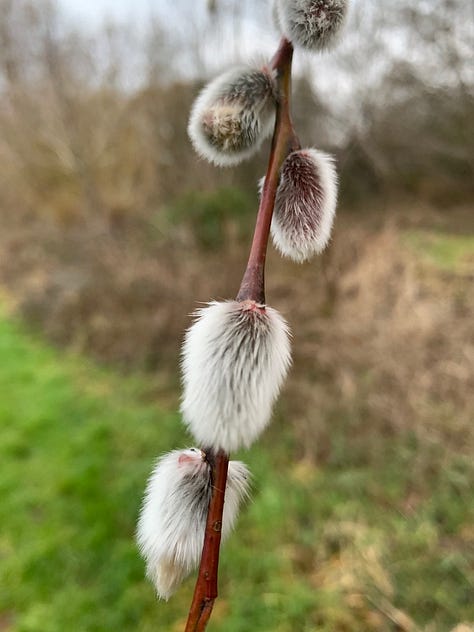
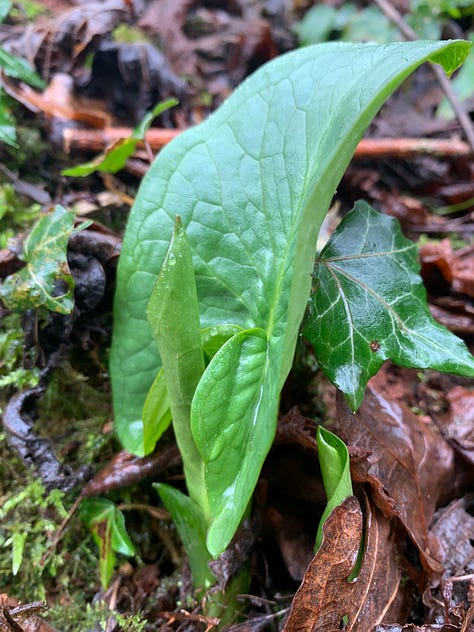
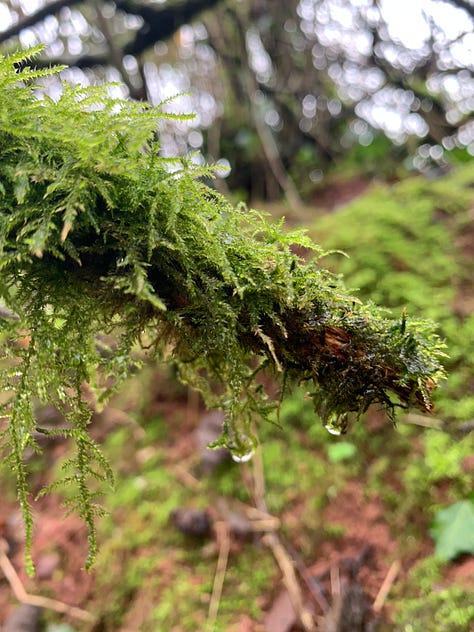
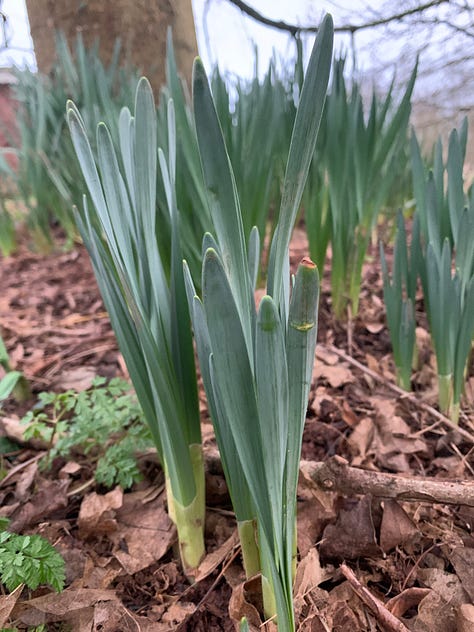
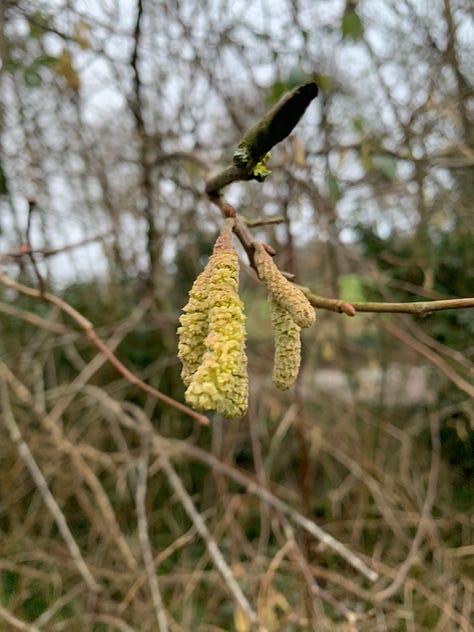
It’s all about the weather
I have a moment of existential clarity as I climb the chilly stairs from the fire-warmed lounge, weary from the day, and see the same scene on the wallpaper as always. A monkey is perching on a blue fern looking at a tiny frog who is teetering at the cavernous-mouth of a lily. We are there, hovering at the cavernous mouth, I think, and one day we will become ghosts in the house. Like the woman who lived in the back bedroom, cooking on a camping stove and watching the stars through the hole in the roof, the young woman whose babies and infants are buried in the churchyard. Others will come into the house, their feet echoing the stairs, their hands papering the walls. They in turn will curse the cold of these red stone walls.
The next day I go down to Shaky Bridge at the foot of our little valley, a circuit I walk when I need to shake off sadness and worry. I walk across the little bridge over the Creedy, stopping to watch the brown swirl of the water. Passing the barn I call, ‘not long now’, to the bullocks pacing at the gate of the barn. They can smell the first growth, despite the biting easterly wind, in the neighbouring field. I stop and sit on the steps with my back against the Norman door at Upton Hellions church - the place I go for solace now I no longer have trees to sit beneath - and feel the company of the people sleeping below the earth. Across the valley the first sweep of green is prickling the ploughed red earth of the tilting fields. The season is turning again.
Down at the banks of the Creedy I crouch amongst the peace of the snowdrops. There are swathes of them amongst the rusting bracken fronds and the new green of cow parsley, the frilly roundels of pennywort.
If only for a moment, things begin to feel better.
Things I’ve been ‘enjoying’
Wealth, Thinking Allowed, BBC R4: Laurie Taylor talks to Brooke Harrington, Professor of Economic Sociology at Dartmouth College, New Hampshire, about the world of offshore finance, how it works and its impact, globally.
James McKenzie Podcast: #71 George Monbiot - How we beat the Invisible Doctrine - an illuminating conversation about democracy, the nature of power and the power of commonality, on human nature, belonging, and village thinking.
The new world order is exactly what it looks like. Are we too frozen with fear to name it? Zoe Williams saying the unsayable in The Guardian.


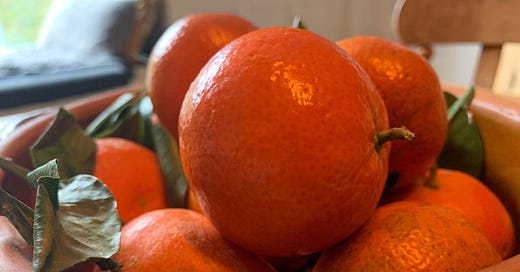



Its tough at the moment, and there's plenty of evidence to say it is going to get worse, so let's take heart: spring is coming - 'not long now!' - and most people most of the time are kind and funny, and if we don't take good care of ourselves and each other we won't have the energy to connect and create and communicate something more hopeful for the future! Your writing is part of that process - 'against the ruin of the world there is only one defence - the creative act!"
Representing the Feminist Crank Faction, I observe that these massed banks of “leaders”—laying waste to what we thought were promises, firm commitments & the desire to do good for our world—are absolutely almost entirely, men. And white men mostly, at that. I share your grinding & shrieking impulses, but I hope to channel them into preparing for the future time when the “next wave” arises. I’m polishing a set of deadly, vociferous arguments, e.g. for all world leaderships in the future to routinely be 50% female (those who give birth to the future generations have more awareness of what’s at stake), plus a dead-stop-dead end to all sexual abuse, etc.
Also, it is indeed coming into Spring, I have wonderful people around me & a rich creative life.
I also have some excellent podcasts, voices of reason (mostly American) making me feel a bit more sense of perspective. I recommend “The Bulwark Podcast“ & “Pod Save America” in particular.
Let us rage against injustice, but also dance with joy!